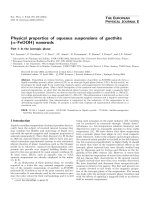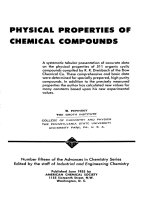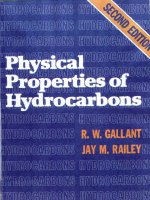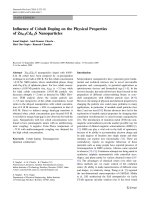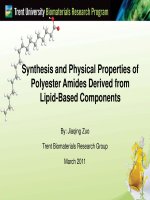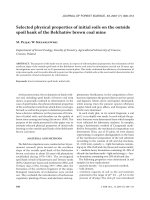Physical properties of dates fruits
Bạn đang xem bản rút gọn của tài liệu. Xem và tải ngay bản đầy đủ của tài liệu tại đây (209.56 KB, 7 trang )
Int.J.Curr.Microbiol.App.Sci (2019) 8(4): 1243-1249
International Journal of Current Microbiology and Applied Sciences
ISSN: 2319-7706 Volume 8 Number 04 (2019)
Journal homepage:
Original Research Article
/>
Physical Properties of Dates Fruits
N.N. Desai1, V.M. Modi1, G.K. Saxena2, Ramesh Harajibhai Chaudhari1,
Manoj Kumar Jaipal3, K.H. Gohil1 and Alok Gora2*
1
College of Renewable Energy and Environmental Engineering
Department of Agricultural Engineering, C.P. College of Agriculture
3
College of Food Technology, Sardarkrushinagar Dantiwada Agricultural University,
Sardarkrushinagar- 385506 (Gujarat), India
2
*Corresponding author
ABSTRACT
Keywords
Date palm,
Physical Properties
Phoenix
dactylifera
Article Info
Accepted:
10 March 2019
Available Online:
10 April 2019
Date palm (Phoenix dactylifera L.) is a monocotyledon of the family of the Palmae. The
date palm is grown in Kutchh region of Gujarat. The physical properties of dates fruits
(Variety: Zahidi) are necessary for the design of the equipment to handle, transport,
process and storage. In this study some physical properties of dates fruits determined as a
function of moisture content namely, dimensions, arithmetic and geometric mean diameter,
sphericity, surface area, 1000 unit mass, bulk density, true density, porosity, angle of
repose and coefficient of static friction. The average values of length, breadth and
thickness of date palm fruit at different moisture content 69.5 and 61.56 % (w.b.) were
found to be 33.65 and 33.12 mm, 22.12 and 22.03 mm, 20.02 and 19.95 mm respectively.
The arithmetic and geometric mean diameter of fresh date fruit ranged from 24.29-26.59
mm and 23.51-25.96 mm respectively. The value of sphericity for different moisture
content varied from 0.73 to 0.737. The bulk density varied from 491 to 477 kg/m 3. The
true density decreased from 576 to 533 kg/m3. The porosity varied from 10.56 to 14.75 %
for the moisture content of 61.56 and 69.5% (w.b.). The angle of repose increased from
18.76 to 21.34o. It was found that the coefficient of static friction of date fruits varied from
0.31-0.35 (wood surface), 0.30-0.33 (steel surface) and 0.25-0.27 (glass surface).
Introduction
Date palms are the fruits grow on the palm
tree belonging to the family of Arecaceae in
the genus: Phoenix and scientifically named
as Phoenix dactylifera. Kutch is the largest
Date-palm producing region in India, with a
whopping total area under Date-palm farming
of 16,000 hectare and production of 1.2 lakh
tonnes, Pakistan and India hold a significant
position in international Dates market, former
as a second largest exporter and later being
the largest importer of dates in the western
border of India and the coastal belt of Kutch
district of Gujarat contributes about ninety
percent to the total date production in India.
More than 1.5 million date palm trees are
present in Kutch, spread widely from Anjar to
1243
Int.J.Curr.Microbiol.App.Sci (2019) 8(4): 1243-1249
Mandvi including Mundra and other areas.
This seed propagated population represents a
huge biodiversity of date palm with fruits of
varying qualities. Government initiatives to
promote date palm culture especially in
Gujarat and Rajasthan states leads to
significant increase in area and production of
date palm during the last 15 years. In Kutch,
for example, the area under cultivation
increases from 8,973 ha to 16,000 ha during
last ten years. Date Palm Research Centres at
Mundra in Kutch, Bikaner and Jodhpur in
Rajasthan, Hissar in Haryana and Abohar in
Punjab are working for the promotion of date
palm in their respective regions. There is a
need for a comprehensive study of the
physical properties of date to develop
appropriate technologies for its processing.
The development of the technologies will
require the properties of this fruit. It becomes
imperative to characterize the fruits with a
view to understand the properties that may
affect the design of machines to handle their
processing. Date (Phoenix dactylifera) is well
known for its nutritional contents. It contains
1.9% protein, 70.6% carbohydrates, 2.5% fat,
1.2% minerals and 10% fiber1. The dates are
considered as prime fruit for their nutritional
and therapeutic value.
and immature dates. The physical properties
of fresh date fruits such as size in terms of
length, breadth and thickness, arithmetic
mean diameter, geometric mead diameter,
sphericity, bulk density, true density, porosity,
angle of repose and coefficient of static
friction were determined The methods
employed are referred below. Ten replications
were made for each sample and average value
has been reported.
Materials and Methods
Arithmatic and geometric mean diameter
Physical properties of date fruits
For determination of arithmetic and geometric
mean diameter of dates fruit, values of length,
width and thickness were used. Arithmatic
and geometric mean diameter of date fruits
was calculated by using the following
relationship (Mohsenin, 1980). The arithmetic
and geometric mean diameter is important in
role processing in general.
Fresh dates which was harvested in the month
of June of variety Zahidi was used as a raw
material for drying study. About 500 kg fresh
date of variety zahidi was procured from main
date palm Research Station, S.D. Agricultural
University, Mundra (Kutchh).
Five samples having 100 g weight were
drawn randomly and initial moisture content
of fresh date was determined. The dates were
cleaned and washed. The date were sorting by
manually to remove foreign matters, leaves
Measurement of size
A sample of randomly selected hundred fruits
was used to determine the average size of date
fruit at each moisture content level. Mass of
individual fruit were determined using an
electronic balance with a sensitivity of 0.01g.
Fruit volume will be measure by water
displacement
method.
The
principal
dimensions of date fruits in terms of length,
breadth and thickness are measured with help
of vernier calipers (Mitu and Toyo, Japan)
reading to 0.01 mm. The longest dimensions
in the longitudinal direction were considered
as length. The triaxial dimensions are
measured for 100 fruits randomly selected
from the bulk of date fruits. The average
value of 100 observations is reported.
Sphericity
For determination of sphericity of date fruit is
considered to be a triaxial ellipsoid with
length, width and thickness as intercepts
1244
Int.J.Curr.Microbiol.App.Sci (2019) 8(4): 1243-1249
respectively. Sphericity of date fruit was
calculated
using
following
formula
(Mohsenin, 1980).
their masses have been measured. The true
density was found as an average of the ratio
of their masses to the volume of toluene
displaced by the fruit.
Sphericity (ø) = (abc)1/3/a
Porosity
Surface area
The surface area of date fruit was determined
by analogy with a sphere of the some
geometric mean diameter using the following
equation.
Sa = π Dg2
The porosity is the fraction of the space in the
bulk fruits which is not occupied by the fruits.
The porosity of bulk fruit was calculated from
the values of true density and bulk density
using the relationship given by Mohsenin
(1980) as follow.
£, % =(1-ρb /ρt) X 100
One thousand fruit mass
Angle of repose
To evaluate the 1000 fruit mass, 10 randomly
selected fruits from each moisture level are
weighed on a digital electronic balance (K
Roy Electronics) having an accuracy of 0.001
g.
Bulk density (ρb)
Bulk density as the ratio of weight of fruits to
the volume occupied by the same fruits was
measured with help of two cylinders having
volume of 1000 and 1500 ml. The bulk
density was expressed in kg/m3.The bulk
density of the fruits was determined as follow.
ρb=M/V
True density (ρt)
The true density as a function of water
content was determined using the toluene
displacement method in order to avoid
absorption of water during experiment.
Toluene was used instead of water because it
is less absorbed by fruits, its surface tension is
low so that it fills even shallow dips in fruits,
its
dissolution
number
is
low
(Mohsenin,1980). The fruits were used to
displace toluene in a measuring cylinder after
The angle of repose is the characteristic of the
bulk material which indicates the cohesion
among the individual fruits. If higher
cohesion between fruits then the high value of
angle of repose obtained. The angle of repose
is the angle from the horizontal at which the
material will rest in a pile (Pradhan et al.,
2009). The angle of repose of date palm was
determined by standard circular platform
method. The box having circular platform
fitted inside was fitted with fruit. The extra
fruit surrounded the platform was remove
through discharge hole leaving a free standing
cone of fruits on the circular platform. A
stainless steel scale was use to measure the
height of the cone and angle of repose was
calculated by this formula.
Q= Tan-1 (2h)/d
Coefficient of static friction
The experiment for determination of static
coefficient of friction was performed of date
fruit using test surfaces against wood, steel
and glass surfaces with five replications.
Experiment was performed on a tilting
platform of 350 mm X 120 mm. An open
1245
Int.J.Curr.Microbiol.App.Sci (2019) 8(4): 1243-1249
ended plastic cylinder having 65 mm diameter
40mm height was filled with the fruit and
placed on the adjustable tilting surface. The
platform was raised slightly so as not to touch
the table surface.
The platform was inclined gradually with a
screw device until the cylinder just started to
slide down. The tangent of angle was taken as
coefficient of static friction between the
surface and date fruits given by µ as under.
µ = tan¢
Results and Discussion
Dimensions of date palm fruits
The dimensions are important physical
parameters for drying and storage studies of
date palm fruits. Apart from that, the
dimensions could be useful for determining
the shape of the fruits. The average
dimensions of date palm fruits at different
moisture contents are presented in Table 1.
The mean value of three axial dimensions i.e.
length, breadth and thickness of 100 fruits
measured at moisture contents of 69.5 percent
and 61.56 percent (w.b.) were 33.65 mm and
33.12 mm, 22.12 mm and 22.03 mm and
20.02 mm and 19.95 mm respectively. It was
found that the value of breadth and thickness
were very close to each other.
Jahromi (2007) studied the that, linear
dimensions varied from 33.10 to 42.60 mm in
length, 18.20 to 25.30 mm in width and 17.40
to 24.40 mm in thickness. The relationships
between the axial dimensions (length, breadth
and thickness) and moisture content can be
expressed using the regression equation as:
L = 0.79M+ 6.425, R2 = 0.3156
B = 0.8343M+3.74, R2 = 0.7277
T = 0.840M +3.11, R2 = 0.7579
...(i)
...(ii)
...(iii)
Arithmetic and geometric mean diameter
of date palm fruits
Table 1 indicates the average diameter
calculated by the arithmetic mean and
geometric mean of fresh date palm fruits. As
moisture content increases the average
diameter of fruit also increases. The
arithmetic and geometric mean diameter of
fresh date palm fruits measured at two
moisture contents of 69.50 percent and 61.56
percent (w.b.) were found as 25.26 mm, 25.03
mm and 24.60 mm, 24.41 mm respectively.
The results obtained for the arithmetic and
geometric mean diameter of date palm fruits
were similar to the findings reported by
Aviara et al., (2013), Hobani and Ahmed
(2001), Jahromi et al., (2007) and Davies
(2016). The arithmetic mean diameter and
geometric mean diameter are important in
designing of separating, harvesting, sizing and
grinding machine. The relationships between
the arithmetic mean diameter and geometric
mean diameter and moisture content can be
expressed using the regression equation as:
Da = 0.8255M + 4.185, R2 = 0.7268...(iv)
Dg = 0.8274M + 4.056, R2 = 0.7496...(v)
Sphericity
The value of sphericity for two different
moisture content varied as 0.734 and
0.737(Table 1). This parameter plays
important role in designing of handling
equipment of fruits. It indicates that dates
fruit is oval to cylindrical in shape. On the
contrary, the date palm fruits could be as
cylindrical considering the close value of
breadth and thickness. However the exact
shape of the date palm fruit can be described
as oval to cylindrical with thickest portion at
both end. The shape of the dates fruit in this
study was found similar to the findings
obtained by Hobani and Ahmed (2003),
Jahromi et al., (2007) and Davies (2016). The
1246
Int.J.Curr.Microbiol.App.Sci (2019) 8(4): 1243-1249
relationship between sphericity and moisture
content of date fruit can be represented by
following equation as:
Ø = 0.8844M + 0.0914, R2 = 0.7899...(vi)
Surface area
The surface area calculated at the surface area
of fresh date palm fruits has been presented in
Table 1. The surface area of the date palm
fruit increased from 1870.96 mm2 to 1900.20
mm2 as moisture content increased from
61.56% to 69.5% (w.b.). Similar trend have
been reported by Hobani and Ahmed (2003),
Jahromi et al., (2007) and Davies (2016).The
relationship between surface area of date
palm fruits and moisture content can be
expressed by the following relationship as:
Sa=0.0.988M-71314, R2 =0.7297...(vii)
One thousand fruit mass
As seen in the Table 1, one thousand date
palm fruits mass shows an increased from
8388 g to 8476 g when measured for two
ascending moisture contents of 61.56% to
69.5% (w.b.). Average weight of a whole
fruit, flesh and pit of date palm fruits recorded
were equivalent to 8.48 g 7.24 g and 1.24 g
respectively. The proportionate mass of flesh
and pit found in whole dates fruit was
calculated to be 85.37 percent and 14.63
percent respectively. The flesh and pit ratio
was 5.84:1. Similar trend have been reported
by Hobani and Ahmed (2003), Jahromi et al.,
(2007) and Davies (2016).The relationship
between one thousand fruits weight and
moisture content of the date palm fruits can
be expressed by the following relationship as:
M1000 = 0.0069M + 7.31, R2 = 0.6755...(viii)
Bulk density
The value of bulk density of the date palm
fruits at different moisture contents were
calculated and presented in Table 1. The bulk
density varied as 491 kg/m3 and 477 kg/m3
which indicated a bulk density decreased with
increase in the moisture content from 61.56
percent to 69.5 percent (w. b.). This parameter
is important for storage study. Davies (2016)
reported the value of bulk density as 512.91
kg/m3. Similar results have been reported by
Hobani and Ahmed (2003) and Jahromi et al.,
(2007). They also reported that the bulk
density of the date palm fruit decreased as the
moisture content increases. The relationship
between bulk density and moisture content of
the dates can be expressed by the following
equation as:
Þb=-1.1099M-15.57, R2 =0.6023...(ix)
True density
The value of true density of the date palm
fruits calculated at two different moisture
contents were presented in Table 1. The true
density decreased from 576 kg/m3 to 533
kg/m3 when the moisture content increased
from 61.56 to 69.5 % (w. b.). Davies (2016)
reported the true density of date palm fruits as
553.71 kg/m3. Similar findings have been
reported by Hobani and Ahmed (2003) and
Jahromi et al., (2007). The relationship
between True density and moisture content of
the date palm fruits can be expressed by the
following equation as:
Þt=-00.794M+6.363, R2 =0.6274...(x)
Porosity
The value of porosity of the date palm fruits
at two different moisture contents were
calculated and are presented in Table 1. The
porosity varied by 10.56 percent and 14.75
percent under moisture content of 61.56
percent and 69.5 percent (w.b.) respectively.
The porosity of date palm fruits is important
because it shows the resistance of the fruits to
1247
Int.J.Curr.Microbiol.App.Sci (2019) 8(4): 1243-1249
air flow during drying process. This
parameter is also vital for storage study.
Davies (2016) reported 14.10 percent for the
same parameter. The relationship between
porosity and moisture content of the date
palm fruits can be expressed by the following
equation as:
£=0.9905M-7.278, R2 =0.343...(xi)
Table.1 Physical properties of fresh date palm fruits
Physical property
Length, mm
Breadth, mm
Thickness, mm
Arithmetic mean, mm
Geometric mean, mm
Sphericity
Surface Area, mm2
Bulk density, kg/m3.
True density, kg/m3
Porosity, %
1000 fruit mass, g.
Angle of repose, degree
Coefficient of static friction
Wood
steel
Glass
33.65
22.12
20.02
25.26
24.60
0.734
1900.20
477.00
533.00
10.56
8476
21.34
Moisture content (%) (w.b.)
69.50
61.56
33.12
22.03
19.95
25.03
24.41
0.737
1870.96
491.00
576.00
14.75
8388
18.76
0.34
0.32
0.26
0.31
0.27
0.24
Angle of repose
Coefficient of static friction
The values of the angle of repose
corresponding to moisture contents are given
in Table 1. The angle of repose increases
18.760 to 21.34o as moisture content increases
from 61.56 percent to 69.5 percent.
The coefficient of static friction of date palm
fruits was determined against three different
structural surfaces i.e. wood, steel and glass.
The results in Table 1 shows that the values of
coefficient of static friction found for two
moisture contents were 0.31 and 0.35 for
wood, 0.30 and 0.33 for steel and 0.25 and
0.27 for glass respectively. Wood sheet
showed highest static coefficient of friction
attributed to greatest surface roughness with
respect to steel and glass surfaces. Glass
showed least coefficient of static friction. This
parameter is important for designing
pneumatic
conveying
systems,
screw
conveyors and hoppers. It is also used in the
calculation of compressibility and flow
Ndubisi et al., (2015) reported that the angle
of repose of date palm fruit and kernel was
found to be 19.82 and 34.94o (digila), 18.07
and 33.36o (krikri), 21.93 and 29.0o (sukur)
and 25.49 and 20.93o (trigal). The relationship
between angle of repose and moisture content
of the date palm fruits can be expressed by the
following equation as:
Tan¢=0.8714M-0.205, R2 =0.2484...(xii)
1248
Int.J.Curr.Microbiol.App.Sci (2019) 8(4): 1243-1249
behaviour of materials used for designing
seed bins and other storage structures (Davis,
2016). Similar results were reported by
Hobani and Ahmed (2001) and Jahromi et al.,
(2007). The relationship between coefficient
of static friction and moisture content of the
date palm fruits for wood, steel and glass can
be expressed by the following equation as:
µw=0.8856M+0.0089,R2 =0.7143...(xiii)
µs=0.8859M-0.0135, R2 =0.6...(xiv)
µg=0.8856M+0.0097, R2 =0.4...(xv)
In conclusion, the average length of the fresh
Zahidi (Variety) date fruit 33.65mm; breadth
21.68 and thickness 20.56 mm. It was found
that the thickness and breadth were very close
to each other while the length was higher due
to its shape of the date fruits. The average
value of the surface area of the date fruit was
obtained 1886.32 mm2. The weight of one
fruit of date was 8.48g. The weight of flesh
date fruit was 7.24 g and weight of date pit
was 1.24g. The percentage of flesh and pit
were 85.37% and 14.63% respectively. The
average value of bulk density was 460 kg/m3.
The average value of true density was 560
kg/m3. The average value of porosity was
20.7%. The angle of repose increase 15.2322.37o as moisture content increases from
61.56 to 69.5%. The average values of angle
of repose of date fruit was 19.34o.The average
value of coefficient of static friction were
0.33 (wood surfaces), 0.31 (steel surfaces)
and 0.26 (glass surface) respectively.
References
“Development of a Neural Network
Classifier for Date Fruit Varieties
Using Some Physical Attributes”, Res.
Bult., No. (126), Agric. Res. Centre,
King Saud Univ., pp. 5-18.
Davies, R. M. (2016) the study of the post
harvest engineering properties date
palm fruit and kernel for primary
processing. Journal of Scientific
Research
in
Engineering
&
Technology Volume (1) Issue (1) Year
(2016).
Keramat, Jahromi, M., A. Jafari, A.R.
Keynani (2007). Some physical
properties of date fruit (Cv. Lastit),
Agril Engineering, International; VolIX, 202-209.
Khaled Selim, Mohamed Abdel-Bary, Osama
Ismail (2012). Effect of irradiation and
heat treatments on the quality
characteristics of siwi date fruits. Agro
Life Scientific Journal - Volume 1,
2012 CD-ROM ISSN 2285-5726
Mohsenin, N. N. (1980). Physical properties
of plant and animal materials, Gordon
and Breach Science publishers, New
York.
Ndubisi A. Aviara, Mary E. Onaji, Abubakar
A. Lawal. (2015). Moisture dependent
physical properties of Detarium
microcarpum seed. AgricEngInt:
CIGR Journal, 17(4):311-326.
Pradhan, R.C., Naik S.N., Bhatnagar, N.and
Vijay,
V.K.(2009).
Moisture
dependent physical properties of
jatropha fruits industrial crops and
products. 29: 341-347.
Ali I. Hobani, AmarNishad M. Thottam,
Khaled
A.M.
Ahmed,(2003).
How to cite this article:
Desai, N.N., V.M. Modi, G.K. Saxena, Ramesh Harajibhai Chaudhari, Manoj Kumar Jaipal,
K.H. Gohil and Alok Gora. 2019. Physical Properties of Dates Fruits.
Int.J.Curr.Microbiol.App.Sci. 8(04): 1243-1249. doi: />
1249
